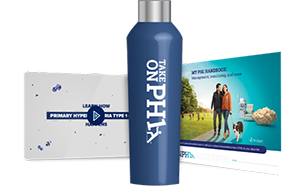
Living with primary hyperoxaluria type 1 (PH1)
In PH1, commitment matters
With personalized management, those living with PH1 can find tips and support to help stay active and engaged with the people and activities that matter to them.
Sign up
Join the community taking on PH1. You’ll receive relevant information on your condition, plus a water bottle.
Sign up & join us
Fitting management into your daily life
It can be challenging to manage PH1—from multiple medications, to a substantial amount of water consumption, to frequent dialysis sessions. Although managing PH1 can be demanding, it’s important to stay motivated to adhere to the management plan you developed with your care team.

Pay special attention during situations that may cause you to become dehydrated: this includes instances such as diarrhea, vomiting, fever, intensive physical activity, and being in a hot environment.

Tips to help stay hydrated
Staying hydrated is an important part of managing PH1. If hyperhydration (drinking a lot of water) is part of your management plan, see the tips below to help you stay hydrated while staying active.
How do you stay hydrated?
Looking for new ideas?
Looking for new ideas?
- Set phone reminders to drink water
- Always bring water, especially to new places
- Use an app to track water intake
- Keep filled water bottles wherever they might be needed
- Set deadlines for water intake
- Eat foods with a high water content, like fruits and vegetables
- Drink other fluids, like milk and juice, in consultation with a healthcare provider
- Limit sodas and sports drinks

Patients with PH1 should always talk to their doctor before making changes to their disease management plan.

Your emotional health is important, too
Being unable to recognize when you’re experiencing symptoms of kidney disease can make you feel as if you are not in control. It’s been shown that in people with chronic kidney disease (CKD) or end-stage kidney disease (ESKD) (potential consequences of PH1), the outlook on their disease can influence symptoms of anxiety and depression that they may experience. If you are feeling overwhelmed, consider speaking to a mental health professional.
There are other things you can try if you're feeling stressed
- Practicing relaxation techniques, such as meditation, relaxation, or breathing exercises
- Getting regular exercise
- Making time for hobbies
- Journaling
- Staying connected with friends
- Setting goals and priorities
Be the author of your own story
No one knows you, or your unique experiences with PH1, better than you do. There are multiple ways you can consider sharing your journey with PH1, like keeping a journal or telling your story to others.

PH1 Perspectives: Facing an Invisible Disease

Seth - Living with Primary Hyperoxaluria Type 1 (PH1)



There's more support for you to lean on
See the educational resources that can help make living with PH1 more manageable.
find Support
